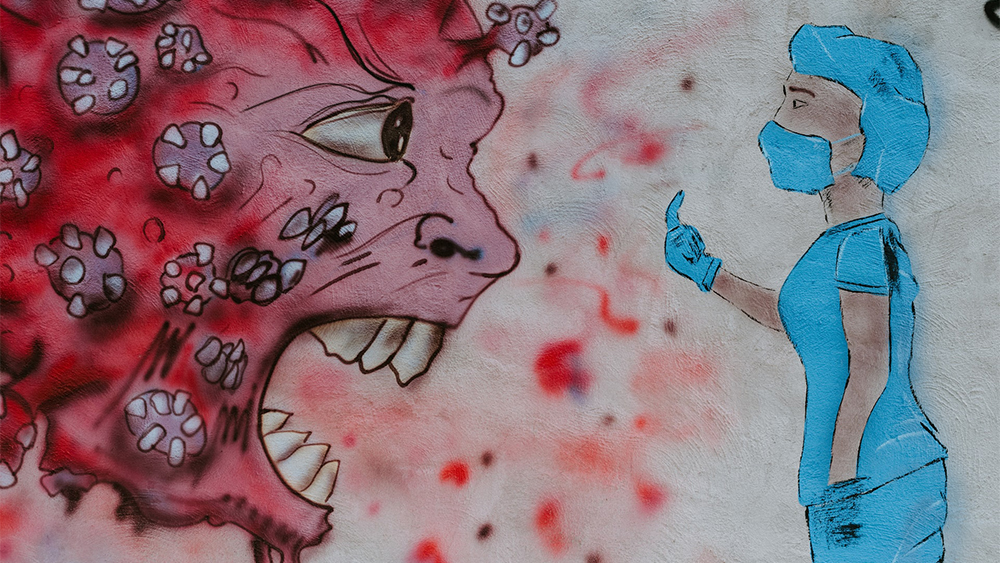Challenging the scepticism and resistance in the public response to the COVID-19 vaccine is deeply important to the state of public health. This is a critical conversation because people are protesting the COVID-19 vaccines not just in South Africa, but globally too, writes Giovanni Poggi from the Nelson Mandela University.
As a teacher of political philosophy, I think it’s important to dispel the notion that the call to vaccinate is an infringement on acceptable liberal freedoms.
Based on a significant number of years of studying, reading and teaching the works of the world’s most important philosophies, I am of the view that the anti-vaxxer position that being “forced to take the vaccine is an infringement on their liberal rights” is a misinformed stance.
Through a liberal lens that looks at positive freedom versus negative freedom, I want to show how taking the vaccine essentially creates positive (or nett) freedom. Anti-vaxxers against the COVID-19 vaccine may be considered selfish by demanding freedom in an absolute sense. Negative freedom supports the idea that there should be no restrictions or boundaries on any free activity. This can become incredibly problematic when it comes to public health.
For example, think of restricting where people can smoke. These are in place to ensure that the majority of people (non-smokers) are protected from the risks associated with passive smoke inhalation.
In a similar vein, anti-vaxxers should perhaps be reprimanded and regulated for not willingly taking the COVID-19 vaccine. The ethical focus is to promote universal immunisation and positive freedom for everyone in society.
The liberal philosophies that we might use to challenge the “anti-vaxxer’s freedom to choose” position are Jeremy Bentham’s (1789) Utilitarianism, JS Mill’s (1859) Harm Principle and Isiah Berlin’s (1969) reflections on Positive Freedom.
This trajectory of liberal thought over the last 200 years is pivotal to the development of the liberal democratic freedoms we experience today. Let’s unpack the theories a little more.
What the philosophers have to say
Let me start by addressing the philosophical dilemma of the anti-vaxxer’s “freedom to choose”.
The need to maintain individual freedoms is the most important mandate of the modern liberal state.
Today’s liberal democratic understanding of freedom (with acceptable restraint) was an idea first conceived over 200 years ago. In political philosophy, Jeremy Bentham’s (1789) Utilitarianism suggests that policies should be created to provide the greatest amount of felicity (or happiness) for the largest portion of society.
This forms the crux of the conversation surrounding COVID-19 vaccinations.
Read more: South Africa’s immunisation record risks being dented by anti-vaccination views
Presently, it is understood that for the sake of public health and the “common good”, all citizens should take one of the certified COVID-19 vaccinations. The reason for this is that it will create a greater nett freedom for everyone in that given society.
The alternative is absolute and unrestrained freedom not to vaccinate, which puts pressure on our common freedoms and could prolong lockdown measures.
Continuing this theme on a positive application of freedom, J.S. Mill (1859) provides us with a sophisticated ethical proposition, the Harm Principle. This principle suggests simply that we should be free to pursue our individual will, as long as it does not cause harm to someone else.
Whereas it may be an indirect influence, this principle nestles neatly into the ethical position held by many laws and policies passed in liberal democratic societies.
Many countries, including South Africa, have used it in public smoking legislation for instance, by regulating smokers to confined areas in public so that they do not bring harm to non-smokers.
This leads us to ask the same questions about the freedom of movement of unvaccinated people in public. It is unquestionable that someone who refuses the COVID-19 vaccine could effectively bring harm to their broader community. The science is clear on this, crowded hospitals all over South Africa are reporting that almost all COVID-19 related hospitalisations are presently coming from the unvaccinated portion of society. This creates a further detriment to the implementation of positive freedom in society.
Isaiah Berlin’s (1969) thoughts on positive freedom best diagnoses the dilemma of the anti-vaxxer, as it allows us to ponder their desire for the unrestrained “freedom to choose”.
Absolute and unrestrained freedom is also known by theorists as negative freedom. While negative freedom may sound enticing, it could be severely detrimental to society and communities if applied strictly. It is acceptable in a progressive society that we accept limitations on our freedom, so as not to infringe on the freedoms of others.
Read more: Compulsory COVID-19 vaccination in Nigeria? Why it’s illegal, and a bad idea
It is important then to convey that the verifiable science on vaccines should not be politicised further.
There is also a link to be made between the African communitarian philosophy of Ubuntu (Humaneness) and positive freedom. Ubuntu remains somewhat of a clichéd call to civic nationalism and the fostering of a mutual help society in a fractured South Africa.
However, the isiZulu phrase, Umuntu ngumuntu ngabantu, (I am, because we are) proves an important building block in society. “I am because we are” simply implies that: I am part of my community, where the good I do reflects back onto the society. This can be incredibly significant in the face of vaccine scepticism and anti-vaccination ideas.
South Africans in particular should heed the call of Ubuntu to mobilise toward vaccination, as it advocates for the “common good” and encourages communitarian benefits for broader society. This in turn promotes positive freedom.
What it adds up to
There are many debates to be had in an evolving society where freedom of speech and choice will take centre stage. But, in my view, the COVID-19 vaccination shouldn’t be one of them. Armed with ideas such as utilitarianism and the harm principle, the application of positive freedom might see many liberal democracies eventually prohibit the anti-vaxxer’s spread of misinformation and protests against vaccination.
Read more: Why COVID-19 vaccines should be mandatory in South Africa
It is imperative that citizens are made to understand that this is a matter of public health, the science is verifiable, and that 99.9% of the global medical community backs the rollout of the COVID-19 vaccine.
Hence, getting vaccinated is for the “common good” of society and promotes the more desirable aspects of positive freedom.
There is no time to delay
South Africa is a tinderbox for COVID-19 outbreaks and potential virus mutation. Embracing positive freedom’s emphasis on utility and minimising harm, while emphasising the communitarian benefits of vaccinating, provides a clear imperative for action.
The country needs to vaccinate as quickly as possible so that its people can return to some semblance of normal life. A life where all can freely pursue their goals, remaining mindful that freedom without reasonable restraint will inevitably bring harm to others.
Giovanni Poggi
Lecturer in Political Science at Nelson Mandela University
This article is republished from The Conversation under a Creative Commons license. Read the original article here.


